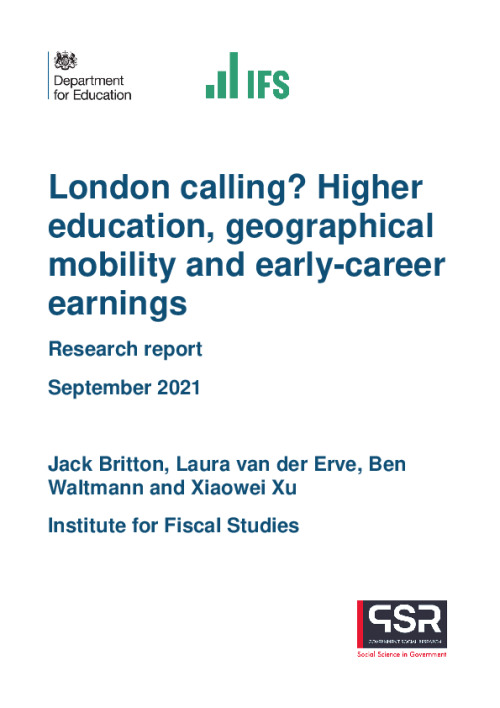In this report, we study the link between higher education, geographical mobility and outcomes for individuals and regions. First, we examine whether higher education is associated with greater geographical mobility even when we control for confounding factors, such as the fact that graduates tend to be wealthier and have higher educational attainment. We examine how mobility – and the relationship between higher education and mobility – differs across socio-economic and ethnic groups. Second, we consider whether graduates do indeed seem to be ‘moving to opportunity’ by analysing the types of areas graduates move to and from and the earnings gains associated with moving. Third, we consider the effect of mobility patterns on regional inequality.
Key findings
Higher education is associated with greater geographical mobility.
- At age 27, around 35% of graduates and 15% of non-graduates have moved away from the travel to work area (TTWA) where they lived at age 16.
- Around two-fifths of the difference in mobility between graduates and non-graduates can be explained by differences in their background characteristics, such as socio-economic status, prior educational attainment and area of origin. All else equal, graduates are 10 percentage points more likely to have moved by age 27 than non-graduates.
- Graduates of more selective universities are more mobile, even controlling for background characteristics and subject choice.
Graduates move to places with better labour market opportunities.
- Graduates tend to move to large cities, especially to London. Around a quarter of graduates who move go to London. In contrast, non-graduates do not disproportionately move to London and other large cities.
- In general, places with high average earnings attract graduates through migration. Gradu-ates who grew up in places with low average earnings are more likely to move away.
- For a given level of average earnings, cities attract and retain more graduates than other areas. In addition to London, Brighton, Bristol and Leeds all gain large numbers of graduates through migration.
- By enabling people to move to labour markets that offer better career opportunities, higher education appears to reduce inequality of opportunity between people who grow up in different areas.
Ethnic minorities and those from low socio-economic backgrounds are less likely to move, and the effect of higher education on mobility is much weaker for these groups.
- People from the bottom socio-economic status (SES) quintile are 16 percentage points less likely to have moved by age 27 than people from the top SES quintile, though most of this difference can be explained by differences in prior attainment and other background charac-teristics.
- Young adults of Indian and Pakistani ethnicity are around 7 percentage points less likely to have moved by age 27 than White British people, even controlling for differences in background characteristics.
- Higher education appears to have a much smaller impact on mobility for low SES and ethnic minority groups. All else equal, young people from the poorest families are only around 4 percentage points more likely to move if they graduate from university. Black and Asian graduates are no more mobile than Black and Asian non-graduates.
- Of those who do move, low-SES graduates are less likely to move to major cities than grad-uates from higher-SES backgrounds, even controlling for background characteristics.
Graduates gain higher earnings from moving.
- On average, male graduates who move earn 10% more at age 27 than otherwise similar graduates who do not move. For women, the estimated gain to moving is 4%.
- Estimated ’moving premiums’ are very similar across SES and ethnic groups, with the exception of Asian women, for whom movers earn less than stayers.
- There is large variation in moving premiums across subjects. Moving is associated with little or no gain in earnings (controlling for background characteristics) in nursing, education and social care, but very large gains among graduates of law, technology, languages, business and economics – particularly for graduates who move to London.
- This suggests that moving to certain areas might be necessary to take full advantage of the returns to some degrees.
Patterns of mobility exacerbate regional inequality in skills.
- Rates of higher education participation vary hugely across the country. Less than 20% of people born in the late 1980s who grew up in Grimsby and Wisbech went on to get degrees, compared with over 40% of those from Tunbridge Wells and High Wycombe.
- Many cities that gain large numbers of graduates through migration – such as London, Brighton, Leeds and Bristol – already have relatively high levels of higher education par-ticipation.
- In contrast, many places with low levels of higher education participation, such as Grimsby and Wisbech, further lose graduates through migration.













